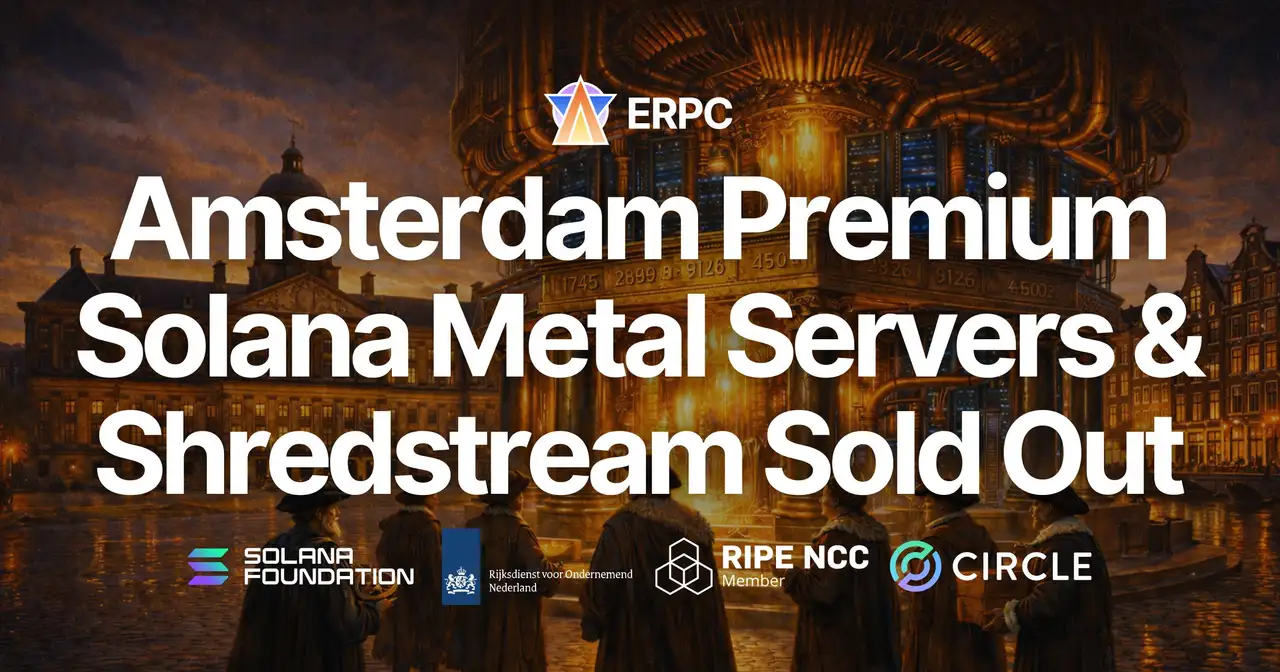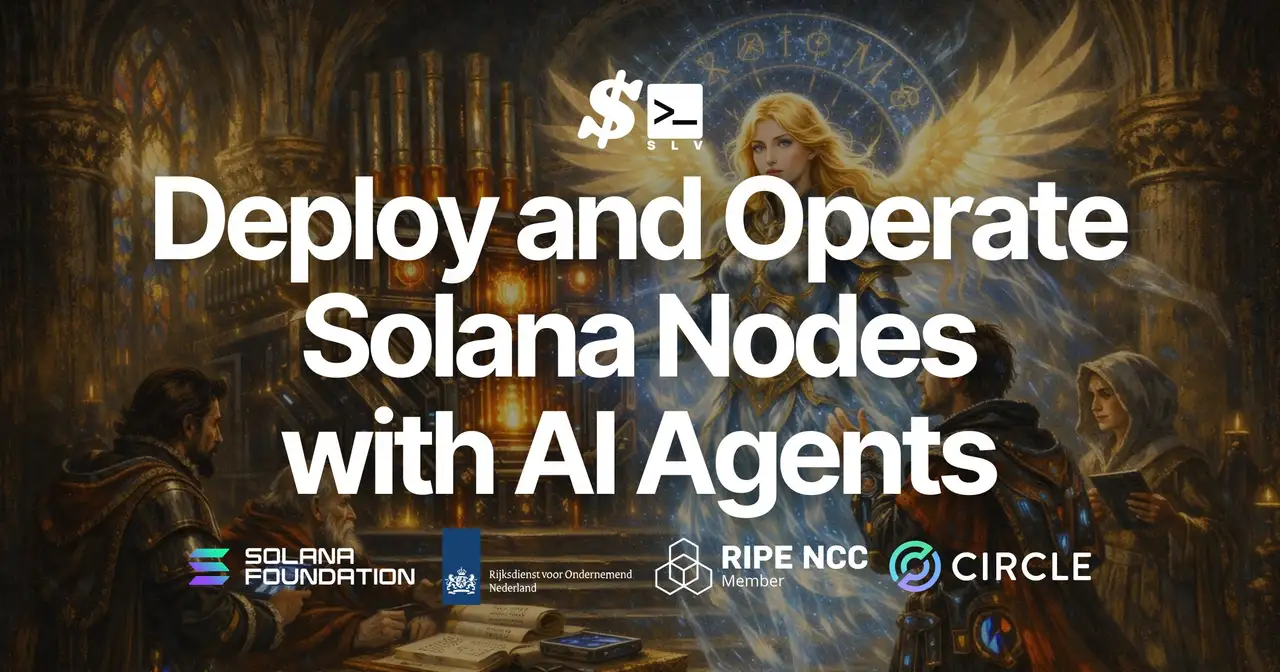ERPC Announces Complete Sellout of Premium Bare-Metal Servers for Solana High-Frequency Trading (HFT) in Tokyo Region
ERPC Announces Complete Sellout of Premium Bare-Metal Servers for Solana High-Frequency Trading (HFT) in Tokyo Region
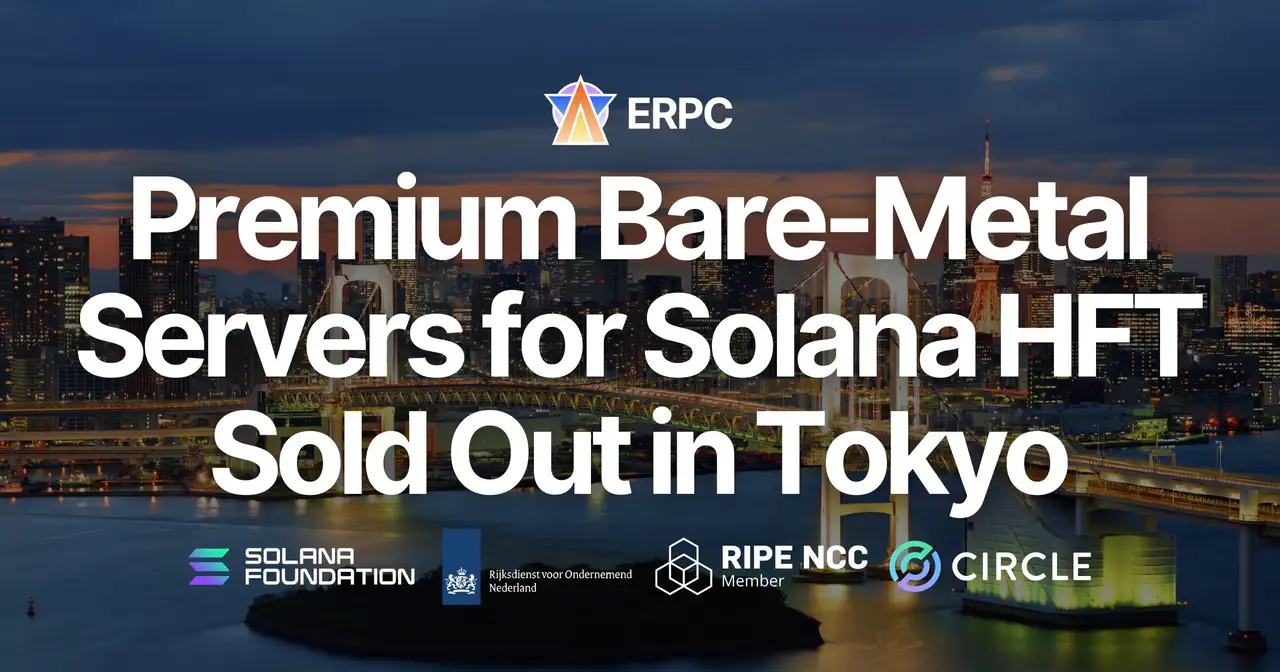
ELSOUL LABO B.V. (Headquarters: Amsterdam, the Netherlands; CEO: Fumitake Kawasaki) and Validators DAO announce that all Premium Bare-Metal servers for Solana high-frequency trading (HFT) offered in the Tokyo region have now sold out.
The Tokyo region has become a central hub for Solana observation and high-speed trading across Asia. Demand for Premium Bare-Metal servers in this region has continued to grow, particularly for HFT, MEV, and real-time analytics workloads.
Additional batches are currently being procured, but availability will remain limited and offered on a restricted basis.
Additional batches are currently being procured, but availability will remain limited and offered on a restricted basis.
Strategic Importance of the Tokyo Region for HFT
Tokyo is one of Asia’s largest internet hubs, hosting major submarine cable landings, IXs, and financial networks.
It is also a central point for large-capacity submarine cables connecting North America and Asia, making it an extremely important location for latency-sensitive financial transactions and real-time data processing.
It is also a central point for large-capacity submarine cables connecting North America and Asia, making it an extremely important location for latency-sensitive financial transactions and real-time data processing.
Solana validators are globally distributed, but within Asia, nodes near Tokyo play a critical role. The speed at which data can be detected in Tokyo directly affects trading strategies and execution.
While many Shreds-based services rely primarily on Frankfurt (FRA) data sources, ERPC provides full high-performance data infrastructure directly within Tokyo, including:
- Large-scale Solana RPC nodes
- Geyser gRPC nodes
- Tokyo-origin Shredstream (UDP / gRPC)
These components operate within the same network fabric, enabling users to capture region-specific data at the fastest possible speeds. This architecture is widely used for HFT, arbitrage, observability, and other latency-critical workflows.
Premium Bare-Metal Server Specifications in Tokyo
The Premium Bare-Metal servers offered in the Tokyo region feature:
- Ryzen 9950X (5.7GHz, 16 cores)
- ECC DDR5 memory
- NVMe4 storage
- Up to 50Gbps network throughput
- Fully dedicated hardware with zero virtualization overhead
- Zero-distance topology with Solana RPC, Geyser gRPC, and Shredstream
By operating without virtualization, CPU, memory, and storage resources can be allocated to applications without loss. This ensures stable and predictable performance for HFT, MEV searchers, high-speed transaction submission, and real-time Shreds analysis.
In particular, Tokyo’s geographical proximity to Asian users and the ability to process Tokyo-origin Shreds within the same network has driven consistently strong demand.
Premium Bare-Metal Pricing
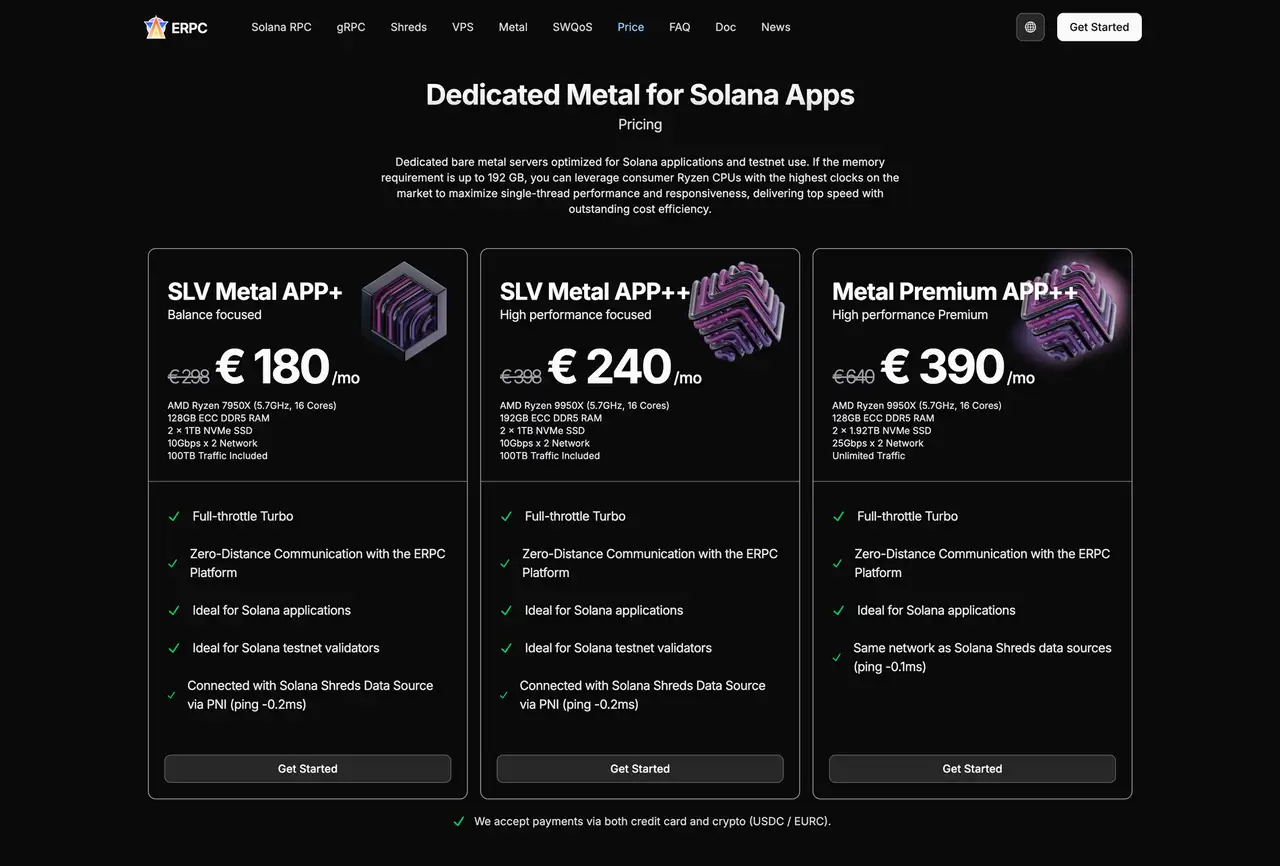
ERPC’s Premium Bare-Metal servers are designed to operate within the same network as Solana clusters, Jito Block Engine, and Geyser gRPC nodes, ensuring the shortest theoretical data path.
By eliminating virtualization layers, these servers offer a significant advantage in workloads where milliseconds—or even microseconds—impact results.
By eliminating virtualization layers, these servers offer a significant advantage in workloads where milliseconds—or even microseconds—impact results.
Historically, in financial systems, even a difference of a few centimeters in cable length has influenced cost and competitive advantage.
Solana’s network follows the same principles: proximity to block producers and primary nodes directly affects performance.
Solana’s network follows the same principles: proximity to block producers and primary nodes directly affects performance.
ERPC’s Premium Bare-Metal servers leverage this proximity to deliver consistently high performance, which is why demand remains strong.
Cost-Efficient Alternative: Premium Ryzen VPS
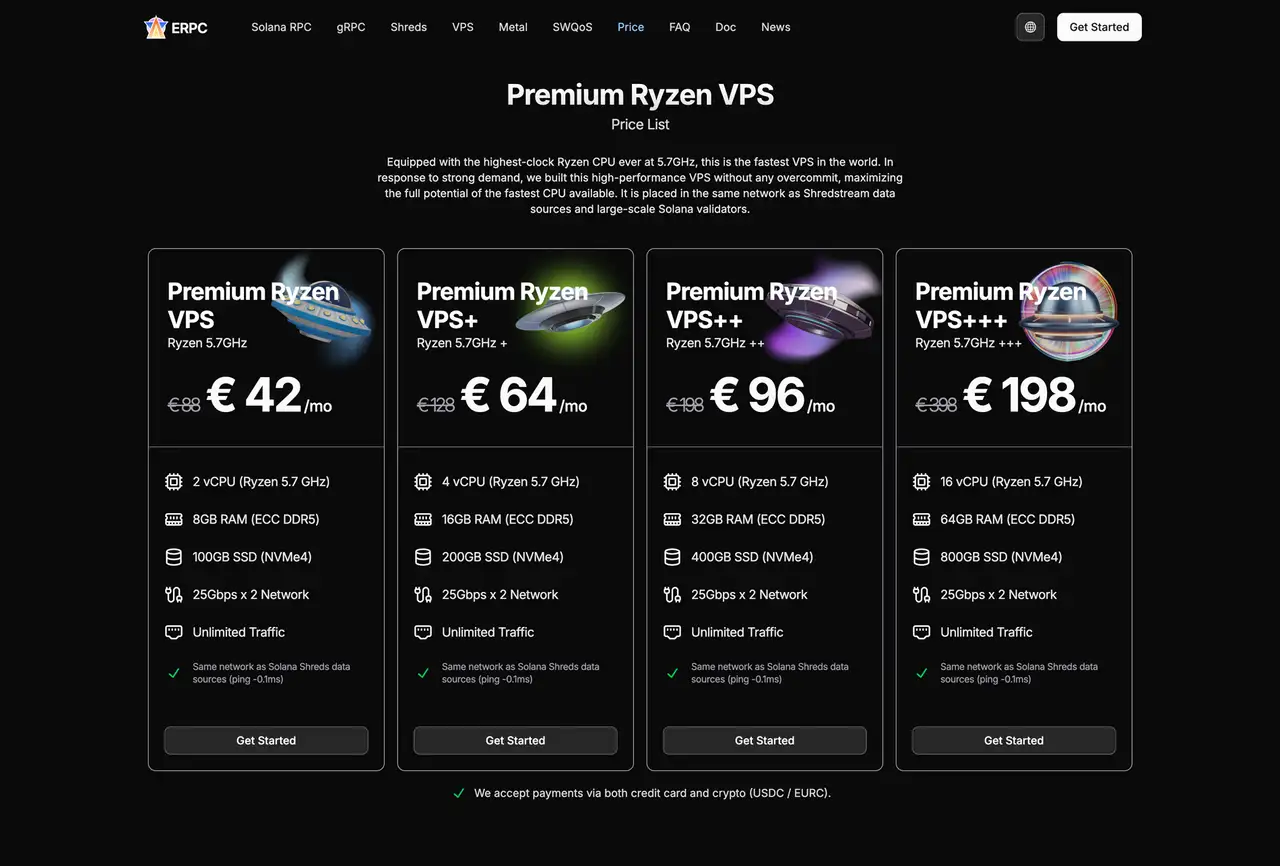
While bare-metal servers provide the highest possible performance, they are not always required for every workload.
For many developers, Premium Ryzen VPS has become the preferred option.
For many developers, Premium Ryzen VPS has become the preferred option.
Premium Ryzen VPS includes:
- 5.7GHz Ryzen CPU (one of the fastest available globally)
- ECC DDR5 memory
- NVMe4 storage
- Dual 25Gbps networking
- Zero overcommitment dedicated resources
- Zero-distance architecture with RPC, gRPC, and Shredstream
Despite being a virtualized environment, Premium Ryzen VPS maintains performance comparable to bare-metal servers, making it ideal for:
- Multi-region deployments
- Staging-to-production transition workflows
- Applications requiring 8–64GB RAM
Globally, environments offering 5.7GHz CPUs with ECC DDR5, NVMe4, and dual 25Gbps links—without overcommit—are extremely rare.
Premium Ryzen VPS has therefore become a highly valued choice for teams needing both performance and availability.
Premium Ryzen VPS has therefore become a highly valued choice for teams needing both performance and availability.
Many developers report that Premium Ryzen VPS delivers performance far beyond what they experienced with conventional VPS products, and it is consistently praised for both speed and cost efficiency.
Limited Inventory and Future Supply Policy
Premium Bare-Metal servers and Premium Ryzen VPS both depend on extremely high-quality backbone networks, dedicated fiber routes, high-performance hardware, and reliable data center environments.
Globally, very few locations meet these requirements, making supply inherently limited.
Globally, very few locations meet these requirements, making supply inherently limited.
To meet the needs of performance-focused teams, ERPC and Validators DAO will continue expanding procurement of high-performance servers and network resources.
However, availability will remain limited and offered primarily through waitlist-based allocation.
However, availability will remain limited and offered primarily through waitlist-based allocation.
Those interested in securing future inventory are encouraged to register via the Validators DAO official Discord.
Validators DAO Official Discord: https://discord.gg/C7ZQSrCkYR
Challenges Addressed by ERPC and Validators DAO
- Transaction failures and latency fluctuations common in many RPC environments
- Performance limitations imposed by numerous infrastructure providers
- Significant impact of physical network distance on data quality
- Difficulty for smaller teams to access high-performance infrastructure
Through the development of the open-source Solana NFT card game project Epics DAO, our team experienced firsthand how difficult it was to obtain high-quality, low-latency Solana development environments.
This led us to develop our own platform and build ERPC and SLV based on that expertise.
This led us to develop our own platform and build ERPC and SLV based on that expertise.
Financial applications are especially mission-critical, where latency and errors directly affect user experience.
Solana’s distributed validator architecture and Web3-specific network layering introduce complexity that often results in unpredictable performance for many teams.
Solana’s distributed validator architecture and Web3-specific network layering introduce complexity that often results in unpredictable performance for many teams.
As Solana introduces next-generation technologies such as Alpenglow—with improvements to block confirmation speed and communication layers—ERPC and Validators DAO will continue adapting to these changes and supporting the evolution of the ecosystem.
Both ERPC and SLV are positioned as core components of that mission.
- ERPC Website: https://erpc.global
- SLV Website: https://slv.dev
- elSOL Website: https://elsol.app
- Epics DAO Website: https://epics.dev
- Validators DAO Official Discord: https://discord.gg/C7ZQSrCkYR



